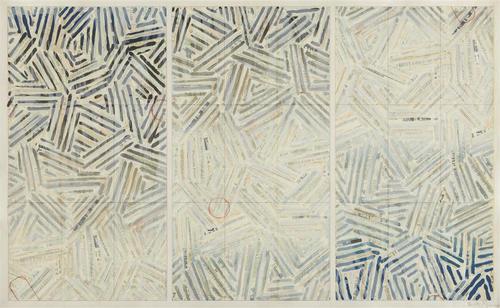
Usuyuki, 1981
Alright, Katy Martin, who made two incredible Jasper Johns films in the late 1970s when you were practically a kid. Uh, actually, yeah, that’s about it. Just watch them.
Harvard’s Sackler Museum just opened a show yesterday, “Jasper Johns/ In Print: The Crosshatch Works and The Logic Of Print,” which features several complex, multi-screen prints Johns made in 1977-80 at Simca Print Artists in New York. Martin’s Super 8mm films documenting the making of are included in the exhibition.
Silkscreens (1978) is a hypnotic performance film showing the printers’ rhythmic routines as they create the 27-screen print, The Dutch Wives (1978).
On her website, Martin mentions folks like Yvonne Rainer, which makes sense, but Silkscreens also makes me think of the 1974 film Humain, Trop Humain, if Louis Malle had shot it in an cramped printing studio instead of a Citroen factory. Great stuff, and with a great, remixed, found/ambient soundtrack by Richard Teitelbaum, which, according to folks who know, like @JohnPyper, would drive actual printers crazy.
The other, longer film, Hanafuda/Jasper Johns (1977-81), combines footage of Johns himself working on two print editions, Usuyuki and Cicada, with audio excerpts of his interview with Martin. Johns kept complicating my notion of silkscreening as a very photomechanical process by repeatedly and extensively painting right onto the screen.
Whether it’s calculated or sincere, Martin’s unassuming questions seem very effective at getting Johns to talk. And after getting so much out of him, my favorite question is the last one, which is only in the published transcript, and which he tries, too late, not to answer:
KM: And then I wanted to talk something about meaning but
JJ: About what?
KM: Meaning. In the work. But I wasn’t sure how far to go with that. But I can’t help thinking about meaning to some degree.
JJ: Well, you mean meaning of images? I don’t like to get involved in that because I–any more than I’ve done–I tend to like to leave that free…. The problem with ideas ís, the idea is often simply a way to focus your interest in making a work. The work isn’t necessarily, I think-a function of the work is not to express the idea…. The idea focuses your attention in a certain way that helps you to do the work.
